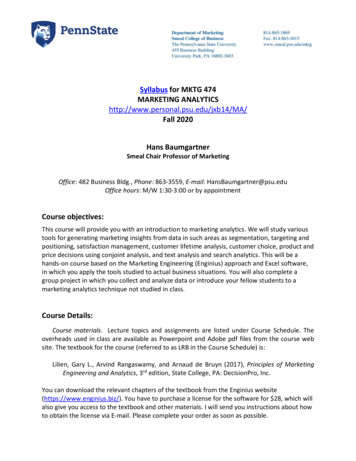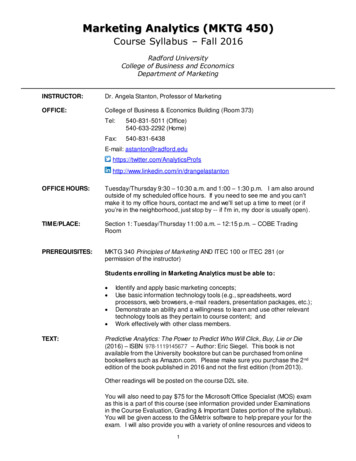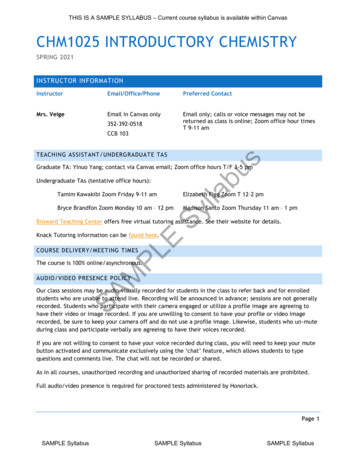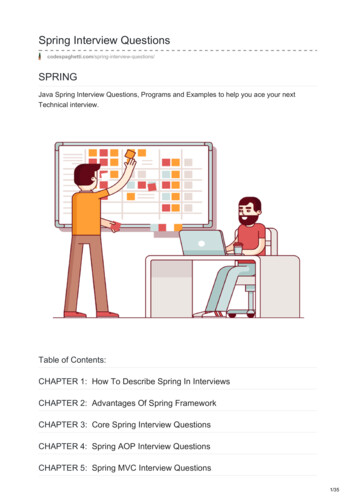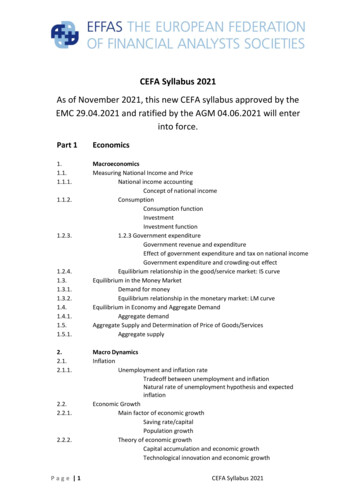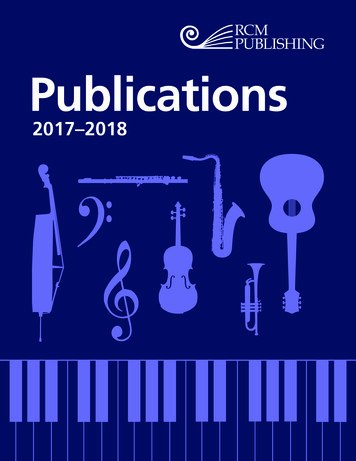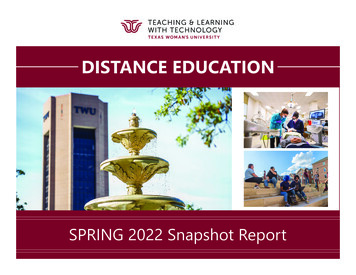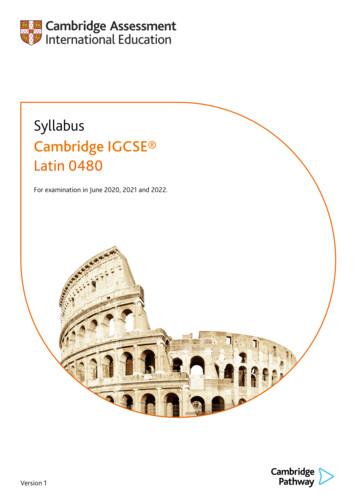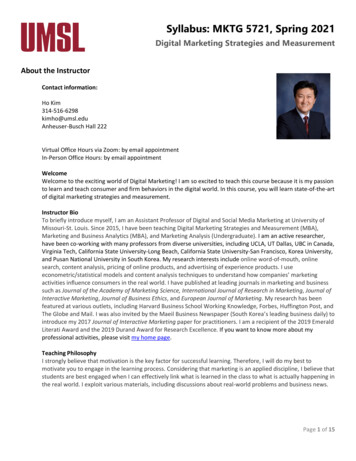
Transcription
Syllabus: MKTG 5721, Spring 2021Digital Marketing Strategies and MeasurementAbout the InstructorContact information:Ho Kim314-516-6298kimho@umsl.eduAnheuser-Busch Hall 222Virtual Office Hours via Zoom: by email appointmentIn-Person Office Hours: by email appointmentWelcomeWelcome to the exciting world of Digital Marketing! I am so excited to teach this course because it is my passionto learn and teach consumer and firm behaviors in the digital world. In this course, you will learn state-of-the-artof digital marketing strategies and measurement.Instructor BioTo briefly introduce myself, I am an Assistant Professor of Digital and Social Media Marketing at University ofMissouri-St. Louis. Since 2015, I have been teaching Digital Marketing Strategies and Measurement (MBA),Marketing and Business Analytics (MBA), and Marketing Analysis (Undergraduate). I am an active researcher,have been co-working with many professors from diverse universities, including UCLA, UT Dallas, UBC in Canada,Virginia Tech, California State University-Long Beach, California State University-San Francisco, Korea University,and Pusan National University in South Korea. My research interests include online word-of-mouth, onlinesearch, content analysis, pricing of online products, and advertising of experience products. I useeconometric/statistical models and content analysis techniques to understand how companies’ marketingactivities influence consumers in the real world. I have published at leading journals in marketing and businesssuch as Journal of the Academy of Marketing Science, International Journal of Research in Marketing, Journal ofInteractive Marketing, Journal of Business Ethics, and European Journal of Marketing. My research has beenfeatured at various outlets, including Harvard Business School Working Knowledge, Forbes, Huffington Post, andThe Globe and Mail. I was also invited by the Maeil Business Newspaper (South Korea’s leading business daily) tointroduce my 2017 Journal of Interactive Marketing paper for practitioners. I am a recipient of the 2019 EmeraldLiterati Award and the 2019 Durand Award for Research Excellence. If you want to know more about myprofessional activities, please visit my home page.Teaching PhilosophyI strongly believe that motivation is the key factor for successful learning. Therefore, I will do my best tomotivate you to engage in the learning process. Considering that marketing is an applied discipline, I believe thatstudents are best engaged when I can effectively link what is learned in the class to what is actually happening inthe real world. I exploit various materials, including discussions about real-world problems and business news.Page 1 of 15
Syllabus: MKTG 5721, Spring 2021Digital Marketing Strategies and MeasurementAbout the CourseCourse DescriptionThe internet presents unique challenges and opportunities for companies. This course aims to provide thetheoretical as well as practical understanding of the Internet marketplace necessary to adapt to its manychanges. The following topics are covered: (1) an overview of the digital industry landscape and online consumerbehavior; (2) digital marketing strategies (e.g., paid search advertising, display advertising, search engineoptimization) to communicate value to consumers; and (3) analytics to measure digital marketing effectiveness.This course uses three pedagogical tools to achieve the goal: (1) lectures that cover basic concepts and theoriesof digital marketing; (2) business cases that apply the concepts/theories to real-world online marketingproblems; and (3) a business simulation game that focuses on digital marketing communication strategies andtactics.Course ObjectivesUpon competition of this course, students will be able to: describe recent strategic moves in the digital space (e.g., Google, Facebook, Amazon, and Apple) andexplain their drivers, consequences, and implications. explain new consumer behaviors enabled by the internet (e.g., showrooming behavior, spread and useof electronic word-of-mouth) and develop strategies to cope with them. evaluate and build firms’ digital marketing strategies focusing on paid search advertising, displayadvertising, search engine optimization, and social media marketing. assess and demonstrate the complex interactions among marketing channels, online and offline.Course TopicsThis course consists of three topical parts.Part 1: The Digital Industry and Online Consumer Behavior. It is important to understand the overall digitalindustry landscape and how consumers use digital technologies in their purchase processes. Part 1 introducesonline consumer behaviors enabled by the internet and explores the recent strategic moves in the digitalindustry. We will study how firms use the internet to create competitive advantage (Week 1), how the internethas changed consumer shopping behaviors (Week 2), how consumers spread and use electronic word-of-mouth(e.g., user reviews) in their purchase journey and how the eWOM affects firms’ market outcome (Week 3), andhow firms measure online consumer behaviors using various web metrics (Week 4).Part 2: Digital Marketing Strategies and Tools. Part 2 explores various digital marketing tools that firms can useto communicate the value of their products and services to consumers. We will study how firms use paid searchand display advertising to reach out to consumers (Week 5); how they use inbound marketing tools to attract(instead of reaching out to) prospective customers (Week 6); how firms engage with consumers on the socialmedia (Week 7). Week8 will introduce MIMIC Pro (the digital marketing simulation game used in this course);students will run the first two rounds of the simulation game in the week. In Week 9, we will study keycomponents of viral marketing and learn how to make a marketing campaign viral. Finally, Week 10 will explorehow firms can manage their reputations on the internet and how to respond to adverse rumors and fake news.Page 2 of 15
Syllabus: MKTG 5721, Spring 2021Digital Marketing Strategies and MeasurementPart 3: Digital Marketing Measurement and Analytics. Measuring digital marketing effectiveness is importantyet challenging. Module 3 focuses on digital analytics to better assess the effectiveness of digital marketingactivities. We will learn a general tool to optimize digital marketing activities and apply it in the paid searchadvertising context to improve the paid search advertising effectiveness (Week 12). We will appraise theinherent complex interactions of different online marketing tools (Week 13). Finally, we will learn that onlinemarketing activities do not work in silos but interact with offline marketing activities (Week 14).In the last three weeks of the semester, we will review the course (Week 15), have the final exam (Week 16),and present the MIMIC Pro simulation (Week 17).This is a Blended Course. What Does Blended Learning Mean?This blended course is designed to integrate asynchronous and synchronous online modes of learning to helpyou engage with the course content and other students to accomplish our course objectives. Each asynchronousand synchronous online component of our course will enrich your learning experience and provide you withopportunities for variation and practice, active learning and interaction with your fellow students. Your weeklysession starts by studying the weekly lecture in an asynchronous mode. In the asynchronous session, you willwatch my lecture videos that walk you through the lecture slides assigned in the week. This should be donebefore Thursday 6 pm, at which we will start our synchronous Zoom session. Our weekly synchronous Zoomsession will start at 6 PM every Thursday and last about 1 hour and 15 minutes. We will spend the synchronousZoom session discussing the assigned case in the week. We can also review the week’s lecture as necessary.For a detailed meeting schedule, please see the Course Schedule table in the syllabus. Thus, each week has twophases around the Thursday meeting: the before-class phase and the during-class phase. Each phase requiresunique student activities.BLENDED SESSION STRUCTUREAND STUDENT ACTIVITIESStudent learn asynchronously Watch lecture videos Read assigned case and write EM Participate in discussion(In Zoom, Thursday 6 – 7:15 pm)Student discuss case synchronously(On Canvas, Monday – Thursday 6 pm)Page 3 of 15
Syllabus: MKTG 5721, Spring 2021Digital Marketing Strategies and MeasurementCourse Materials Coursepack: The course pack is essential for this course as it contains all the course materials (thecourse lecture slides, textbook 1, industry and newspaper articles, and case study materials) except theMIMIC Pro simulation. The course pack is available for purchase athttps://hbsp.harvard.edu/import/790223. Digital marketing simulation game: We will play a digital marketing simulation game (MIMIC Pro byStukent) in the second half of the semester. Every student should purchase the license. The simulationlink will be provided later in the semester.Time Requirements for Our Blended Course:This is an active, blended class with 1 Zoom weekly meeting complemented by online learning experiences inCanvas in between Zoom meetings. Our course is a 3-credit hour course and requires 3 hours of your time eachweek in addition to the time it takes you to read the required materials and and complete the assignments. Thatmeans that you need to plan to spend a minimum of 3 hours every week (up to 4 – 6 hours a week) onactivities related to this course. If you would like to explore how the online Canvas activities work, pleaseconsult the Online Canvas Overview course in Canvas, where you can practice posting to a discussion board,take a practice quiz, and more.Technology Requirements:As a student in a blended course, you are expected to have reliable internet access almost every day. Pleasereach out to your academic advisor or student success network if you need hardware or access to the internet. Ifyou have computing problems, it is your responsibility to address these through the ITS Helpdesk(helpdesk@umsl.edu) or to use campus computing labs. Problems with your computer or other technologyissues are not an excuse for delays in meeting expectations and missed deadlines for the course. If you have aproblem, get help in solving it immediately. At a minimum, you will need the following software/hardware toparticipate in this course:1.2.3.4.5.6.7.Computer with an updated operating system (e.g., Windows, Mac, Linux)Updated Internet browsers (Google Chrome (required) or Mozilla Firefox)Ability to navigate Canvas (Learning Management System)Minimum Processor Speed of 1 GHz or higher recommended.Reliable and stable internet connection.Adobe Reader or alternative PDF reader (free)A webcam and/or microphone is highly recommended.How to Succeed in This CourseThis course is divided into 16 weekly sessions. The activities you need to complete will be inside each weeklyfolder with a clear outline of deadlines for each activity. Common weekly activities include studying the lecturevideos and lecture slides and solving business cases with possible participating in discussion boards. You will also1Gupta, Sunil and Joseph Davin (2019), Marketing Reading: Digital Marketing. Harvard Business Publishing.Page 4 of 15
Syllabus: MKTG 5721, Spring 2021Digital Marketing Strategies and Measurementhave one exam and several written assignments. Please plan to complete assignments as early as you can toallow for any complications you may encounter submitting your work.Assessment/GradingGrade CompositionThe course grade will be based on four individual and two group assignments.- Individual (70%)AttendanceCase analysis executive memoFinal examDiscussion board participationPeer evaluation5%25%15%20%5% Group (30%)MIMIC Pro scoreMIMIC Pro post-campaign report10%20%Discussion Board ParticipationIn most weeks, you will have a “before-class” discussion. Answer all the discussion questions by Thursday 5 pmof the week. To answer discussion board questions, you will need to watch the week’s lecture videos and readthe assigned case. You can earn up to 6 points per discussion board participation. Collectively, the discussionboard activities will account for 15% of your course grade. Refer to the grading rubric in the table below.Discussion RubricExceeds ExpectationsMeets ExpectationsDevelopingNeedsImprovementMissing6 pts.4 pts.2 pts.1 pt.0 pt.Use of analysis, synthesisand evaluationUse of comprehensionand applicationUse of knowledgeCritical and/or creativecontributionIncorporates readings intoresponses, demonstratingsolid understanding.No clear evidence thatreadings wereunderstood or evencompleted.No postingsthroughoutthe weekIncorporates readings wellinto responses,demonstrating excellentunderstanding.Asks questions that extendthe discussion and relateExhibits some insights andunderstanding of coursecontent, but may not askcritical questions of thereadings or fellowstudents.Repeats basiccorrectinformationrelated todiscussion, butneglects to extendconversation orcritically analyzecourse content.Page 5 of 15
Syllabus: MKTG 5721, Spring 2021Digital Marketing Strategies and Measurementmaterial to prior coursecontent.Makes insightful, criticalcomments on the readingsand to fellow students.May relate module’sissues to prior materialcovered in the course.May respond to fellowstudents.Contributes newinformation and identifiesthe source.-Case Analysis Executive Memo (Case EM)For every case discussion, you will prepare a one-page, single-spaced memo. This assignment is designed to help youprepare for the case discussion by (i) summarizing the business environment the focal company is situated in and (ii)identifying the main issues facing the focal company. This is an individual assignment and should be completedindependently by each student. Submit the memo on Canvas by the noon of the class day.-MIMIC Pro Post-Campaign Report (8 pages maximum, double-spaced)After fishing the simulation, each team should write a post-campaign report that summarizes the campaignresults as well as the lessons that you learned from the game. Each team should upload the post-campaignreport on Canvas. This is a group assignment; only one submission is required per team.Grading ScaleThe UMSL Grading System is based on a four-point scale. The grade value for each letter grade is as follows:A : 4.0B- : 2.7D : 1.3EX ExcusedA-: 3.7C : 2.3D : 1.0DL DelayedB : 3.3C : 2.0D- : 0.7FN Failure/NonB : 3.0C- : 1.7F :0ParticipationPage 6 of 15
Syllabus: MKTG 5721, Spring 2021Digital Marketing Strategies and MeasurementCourse Schedule (Subject to change)WeekTopic(Chapter in Course Lecture Slides)Case(For the complete list of weekly readingsuggestions, see the Weekly Reading List section)Assignment1(1/19 – 1/24)Overview of Digital Industry andDigital Marketing (Ch. 1)Amazon, Apple, Facebook, Google2(1/25 – 1/31)Shopping in the Digital Era (Ch. 2)Best BuyEM: Best Buy3(2/1 – 2/7)Electronic Word of Mouth (Ch. 3)United Breaks GuitarsEM: United4(2/8 – 2/14)Measuring Online Consumer Behavior(Ch. 4)5(2/15 – 2/21)Outbound Marketing (Ch. 5)MotorcowboyEM: Motorcowboy6(2/22 – 2/28)Inbound Marketing (Ch. 6)HubspotEM: Hubspot7(3/1 – 3/7)Social Media Marketing (Ch. 7)Big SkinnyEM: Big Skinny8(3/8 – 3/14)MIMIC Pro Introduction & Practice9(3/15 – 3/21)Engineering Virality (Ch. 8)MekanismCase DiscussionForum: MekanismMIMIC Round 210(3/22 – 3/28)Online Reputation Management (Ch.9)TripAdvisorCase DiscussionForum: TripAdvisorMIMIC Round 311(3/29 – 4/4)12(4/5 – 4/11)MIMIC Round 1Spring Break (No Class)Optimizing Sponsored Search (Ch. 11)Air France7Case DiscussionForum: Air FranceMIMIC Round 4
Syllabus: MKTG 5721, Spring 2021Digital Marketing Strategies and Measurement13(4/12 – 4/18)Marketing Resource Allocation (Ch.10)BBVA CompassCase DiscussionForum: BBVACompassMIMIC Round 514(4/19 – 4/25)Balancing Online and Offline (Ch. 12)HBS EECase DiscussionForum: HBS EEMIMIC Round 615(4/26 – 5/2)Course wrap-up16(5/3 – 5/9)Final Exam (Online)17(5/10 – 5/13)MIMIC Pro Post-Campaign ReportSubmissionMIMIC ReportWeekly Reading ListWeek 1: Digital Industry Landscape Gupta, Sunil and Joseph Davin (2019), Marketing Reading: Digital Marketing, Harvard BusinessPublishing. Chapter 1.(Case Study) Deighton, John and Leora Kornfeld (2013), “Amazon, Apple, Facebook, and Google,” Harvard BusinessPublishing.Week 2: Shopping in the Digital Era Gupta, Sunil and Joseph Davin (2019), Marketing Reading: Digital Marketing, Harvard BusinessPublishing. Chapter 2.4. Bell, David R., Santiago Gallino, and Antonio Moreno (2014), “How to Win in an Omnichannel World,”MIT Sloan Management Review. Zeng, Fang, Xueming Luo, Michelle Andrews, and Chee Wei Phang (2014), “Mobile Discounts: A Matterof Distance and Time,” Harvard Business Review.(Case Study) Teixeira, Thales and Elizabeth Anne Watkins (2015), “Showrooming at Best Buy,” Harvard BusinessSchool Publishing.Week 3: Electronic Word of Mouth8
Syllabus: MKTG 5721, Spring 2021Digital Marketing Strategies and Measurement Anderson, Chris (2012), The Impact of Social Media on Lodging Performance, The Center for HospitalityResearch, Cornell University.McGinty, Jo Craven (2016), “For Hotels, Online Reviews Really Matter to the Bottom Line,” The WallStreet Journal, Nov. 18, 2016.(Case Study)Deighton, John and Leora Kornfeld (2011), “United Breaks Guitars,” Harvard Business Publishing.Week 4: Measuring Online Consumer Activities (Web Metrics) Farris, Paul, Neil Bendle, Phillip Pfeifer, and David Reibstein (2015), Marketing Metrics: The Manager’sGuide to Measuring Marketing Performance, 3rd ed. Pearson FT Press. Chapter 10. Matous, Filip, (2015), “3 Ways to Get More out of Your Web Analytics,” Harvard Business Review.Week 5: Outbound Marketing Google, (2014), “What is the Google Display Network?” [available athttps://www.youtube.com/watch?v omXFdKYLRW0&feature youtu.be]. Gupta, Sunil and Joseph Davin (2019), Marketing Reading: Digital Marketing, Harvard BusinessPublishing. Chapter 2.1.(Case Study) Maddux, Robert, Timothy Harr, Martha Gray, Gautam Kanaparthi, Prateek Shrivastava, and MatthewWeiss (2014), “Motorcowboy: Getting a Foot in the Door (A),” University of Virginia Darden School ofBusiness.Week 6: Inbound Marketing Gupta, Sunil and Joseph Davin (2019), Marketing Reading: Digital Marketing, Harvard BusinessPublishing. Chapter 2.2.(Case Study) Steenburgh, Thomas, Jull Avery, and Naseem Dahod (2011), “Hubspot: Inbound Marketing and Web2.0,” Harvard Business Publishing.Week 7: Social Media Marketing Gupta, Sunil and Joseph Davin (2019), Marketing Reading: Digital Marketing, Harvard BusinessPublishing. Chapter 2.3. Katona, Zsolt and Miklos Sarvary (2014), “Maersk Line: B2B Social Media—“It’s Communication, NotMarketing”.” Harvard Business Publishing.2(Case Study) Edelman, Benjamin and Scott Duke Kominers (2012), “Online Marketing at Big Skinny.” Harvard BusinessPublishing.Week 8: MIMIC Pro Introduction2Will be provided by the instructor.9
Syllabus: MKTG 5721, Spring 2021Digital Marketing Strategies and Measurement MIMIC Pro User ManualWeek 9: Engineering Virality Gupta, Sunil and Joseph Davin (2019), Marketing Reading: Digital Marketing, Harvard BusinessPublishing. Chapter 2.3. Teixeira, Thales (2012), “The New Science of Viral Ads: Five Techniques Can Help Companies MakeCommercials That People Will Watch and Share,” Harvard Business Review.(Case Study) Kapner, Suzanne and Sharon Terlep (2019), “Online Influencers Tell You What to Buy, AdvertisersWonder Who’s Listening,” The Wall Street Journal, Oct. 20, 2019. Teixeira, Thales and Alison Caverly (2013), “Mekanism: Engineering Viral Marketing,” Harvard BusinessPublishing.Week 10: Online Reputation Management (Case Study)Teixeira, Thales and Leora Kornfeld (2013), “Managing Online Reviews on TripAdvisor,” Harvard BusinessPublishing.Week 12: Optimizing Sponsored Search (Case Study)Jeffery, Mark. “Air France Internet Marketing: Optimizing Google, Yahoo!, MSN, and Kayak SponsoredSearch.” Case No. KEL319. Evanston, IL: Kellogg School of Management. 2009.Week 13: Marketing Resource Allocation Gupta, Sunil and Joseph Davin (2019), Marketing Reading: Digital Marketing, Harvard BusinessPublishing. Chapter 2.1. Nicols, Wes (2013), “Advertising Analytics 2.0,” Harvard Business Review, March 2013. 3(Case Study) Gupta, Sunil and Joseph Davies-Gavin (2012), “BBVA Compass: Marketing Resource Allocation,” HarvardBusiness Publishing.Week 14: Balancing Online and Offline Nichols, Wes (2013), “Advertising Analytics 2.0,” Harvard Business Review, March 2013. 4(Case Study) Deighton, John and Leora Kornfeld (2012), “Harvard Business School Executive Education: BalancingOnline and Offline Marketing,” Harvard Business Publishing.34Will be provided by the instructor.Will be provided by the instructor.10
Syllabus: MKTG 5721, Spring 2021Digital Marketing Strategies and MeasurementCourse PoliciesParticipationIf you are unable to participate in the scheduled class activity or discussions, you must notify the instructorwithin the week of that class module or discussion. The instructor reserves the right to make judgment to acceptand/or make–up assignments missed because of failed participation in the course activities. It is vitally important that our classroom environment promotes the respectful exchange of ideas. Thisentails being sensitive to the views and beliefs expressed during discussions. Please speak with mebefore recording any class activity. It is a violation of University of Missouri policy to distribute suchrecordings without my authorization and the permission of others who are recorded. I will not respond to each post but will be monitoring each discussion. I will check the discussion boardtwice a week: Tuesday afternoon and Thursday afternoon. Your success in this course will heavily depend on your ability to communicate, engage and participatein all course activities. Successful completion of this course requires that a student keep up with allassignments, coursework and discussions. Timely participation in online discussions is a very importantpart of this course and participation in these discussions, and other activities as assigned, is not optional.You are expected to prepare and post to discussions in a timely manner consistent with therequirements contained within the course syllabus.Attendance Policies Present for the online component of our course is determined by participation in an “academicallyrelated activity,” i.e. submission of an assignment, assessment or discussion forum posting. The last dayof attendance is the last day a student is academically participating in the blended course whether inperson or online as defined here. Documentation that a student has logged into the Canvas course site alone is not sufficient by itself todemonstrate academic attendance. Lack of attendance in-person or submission of work in Canvas could result in an automatic course drop.Academic Integrity/Plagiarism You are responsible for being attentive to and observant of University policies about academic honestyas stated in the University’s Campus Policies and Code of Student Conduct found in the UMSL Bulletin. Academic dishonesty is a serious offense that may lead to probation, suspension, or dismissal from theUniversity. One form of academic dishonesty is plagiarism – the use of an author's ideas, statements, orapproaches without crediting the source. Academic dishonesty also includes such acts as cheating byusing any unauthorized sources of information and providing or receiving unauthorized assistance onany form of academic work or engaging in any behavior specifically prohibited by the faculty member(e.g., copying someone else’s answers on tests and quizzes). Unauthorized possession or distribution ofacademic materials is another type of academic misconduct. It includes the unauthorized use, selling orpurchasing of examinations or other academic work, using or stealing another student’s work,unauthorized entry or use of material in a computer file, and using information from or possessingexams that an instructor did not authorize for release to students. Falsification is any untruth, either11
Syllabus: MKTG 5721, Spring 2021Digital Marketing Strategies and Measurement verbal or written, in one’s academic work. Facilitation is knowingly assisting another to commit an act ofacademic misconduct. Plagiarism, cheating, and falsification are not acceptable.All instances of academic dishonesty will be reported to the Office of Academic Affairs, which willdetermine whether you will appear before the Student Conduct Committee for possible administrativesanctions such as dismissal from the university. The instructor will make an academic judgment aboutthe student’s grade on that work in this course. The campus process regarding academic dishonesty isdescribed in the “Policies” section of the Academic Affairs website.Online Class Netiquette/Behavior Be self-reflective before you post an emotional response. Reread what you have written to be sure it ispositive. Think of your comments as printed in the newspaper. Your online comments will be seen,heard, and remembered by others in the class. Use effective communication.o Avoid the use of all caps or multiple punctuation elements (!!!, ?, etc.).o Be polite, understate rather than overstate your point, and use positive language.o If you are using acronyms, jargon or uncommon terms, be sure to explain them so everyonecan understand and participate in the discussion. Ask for clarification to a point if you feel emotional from a classmate’s post. It is likely that youmisunderstood his/her point. This strategy will also help you step away from the intensity of themoment to allow for more reflection. Sign your name. It is easier to build a classroom community when you know to whom you areresponding. Foster community. Share your great ideas and contribute to ongoing discussions. Consider eachcomment you make as one that is adding to, or detracting from, a positive learning environment for youand your classmates. Be constructive. You can challenge ideas and the course content, but avoid becoming negative online.When you disagree politely, you stimulate and encourage great discussion. You also maintain positiverelationships with others with whom you may disagree on a certain point. Keep the conversation on topic by responding to questions, adding thoughtful comments about thetopics at hand. Online dialogue is like conversation. If there is a certain dialogue going on, please add toit, but if you have something new to say, please post it in another thread. Define your terms. When using acronyms or terms that are particular to your field (or new to ourcourse), please define them for others.Title IX Policies Mandatory Reporting: Under Title IX, I am obligated to report any incidents of sexual harassment,sexual misconduct, sexual assault, or gender discrimination to the Student Affairs office and/or otherUniversity officials. This ensures that all parties are protected from further abuses and that victim(s) aresupported by trained counselors and professionals.12
Syllabus: MKTG 5721, Spring 2021Digital Marketing Strategies and MeasurementStudent ResourcesAccess, Disability and CommunicationYour academic success is important. If you have a documented disability that may have an impact upon your workin this class, please contact Disability Access Services (DAS) immediately. Students must provide documentation oftheir disability to the office of Disability Access Services in order to receive official University services andaccommodations. The staff is available to answer questions regarding accommodations or assist you in yourpursuit of accommodations. Information about your disability is confidential. Once DAS reviews your medicaldocumentation, they will provide you with the information and steps to inform me about the accommodations towhich you are entitled. Your accommodations will begin as soon as we discuss your approved accommodations. 144 Millennium Student Center (MSC) Phone: (314) 516-6554 Email: Tara Cramer, cramert@umsl.edu, or Adam Mann, mannad@umsl.edu Website: http://www.umsl.edu/services/disability/Office of International Students and Scholar ServicesIf you have difficulty communicating in English with the instructor of this course, contact ISS. 362 Social Sciences & Business Building (SSB) Phone: (314) 516-5229 Email: iss@umsl.edu Website: http://www.umsl.edu/ intelstu/contact.htmlStudent Enrichment and AchievementSEA provides comprehensive support and intervention strategies that support your road to graduation! 107 Lucas Hall Phone: (314) 516-5300 Email: umslsea@umsl.edu Website: https://www.umsl.edu/services/sea/Office of Multicultural Student Services (MSS) and the University Tutoring Center (UTC)MSS provides comprehensive student retention services to diverse student populations; through their tutoringcenter, the MSS offers comprehensive tutoring services free to students at UMSL. 225 Millennium Student Center (MSC) Phone: (314) 516-6807 Email: multicultural@umsl.eduWebsite: https://www.umsl.edu/ mcraa/index.htmlTechnical Support13
Syllabus: MKTG 5721, Spring 2021Digital Marketing Strategies and MeasurementOnline Mentor ProgramOnline education requires different teaching, learning, and technology skills than those found in traditional faceto-face classes. We assist students with the online technology in Canvas and provide resources for studying andsuccess in online classes. 598 Lucas Hall Phone: (314) 516-4211 Email: onlinementor@umsl.edu Website: p.htmlCanvasIf you have problems logging into your online course, or an issue within the course site, please contact theTechnology Support Center: Phone: (314) 516-6034 Email: helpdesk@umsl.edu Website:
Syllabus: MKTG 5721, Spring 2021 Digital Marketing Strategies and Measurement. Page . 1. of . 15. About the Instructor . Contact information: Ho Kim . 314-516-6298 . Since 2015, I have been teaching Digital Marketing Strategies and Measurement (MBA), Marketing and Business Analytics (MBA), and Marketing Analysis (Undergra duate). I am an .



